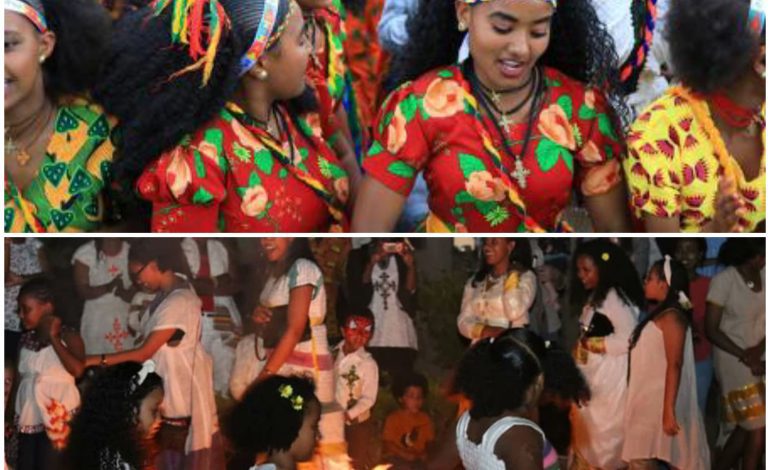Funfair As Ethiopia Celebrates 2017 New Year

Ethiopia stands out as one of the few countries in the world that has maintained its independence for over 2,000 years, boasting a rich and unique history that is untouched by colonization.
One of the most intriguing aspects of this nation is its calendar system, which places it seven years behind the Gregorian calendar used by most of the world. On Tuesday, September 10, Ethiopia celebrated its New Year 2017, marking another year in its own unique timeline.
The Ethiopian calendar, based on the ancient Coptic calendar, has 13 months, 12 of which have 30 days each, and the 13th month, Pagumē, has five or six days, depending on whether it is a leap year. This difference in the calendar is one reason Ethiopia remains distinct from the rest of the world, operating on its own time while adhering to deeply rooted traditions that are centuries old.
As the world moves forward in 2024, Ethiopia’s celebration of the year 2017 reminds us of the incredible diversity of cultures and the different ways in which time and history are understood globally. For Ethiopians, this New Year is not just a time to celebrate the passing of time, but a reflection of their resilience and the preservation of their cultural heritage in the face of external influences.
Unlike many African nations, Ethiopia has never been colonized, which has allowed it to maintain much of its indigenous culture and practices. Its ability to resist colonization, even during periods of intense European imperialism in Africa, is a source of pride for Ethiopians. The nation’s independence has allowed it to shape its own path and continue traditions that are unaltered by foreign powers.
Ethiopia’s unique New Year celebration is deeply intertwined with its religious history, particularly the Ethiopian Orthodox Church. The New Year falls around the end of the rainy season, symbolizing renewal and hope for a prosperous year ahead. The holiday is celebrated with feasts, music, traditional dances, and religious ceremonies that reflect the deep spiritual connection Ethiopians have with their calendar.
The country’s long-standing independence has also allowed it to develop a distinct sense of national identity, which is evident in its New Year celebrations. While the rest of the world operates on the Gregorian calendar, Ethiopia continues to follow its own calendar system, maintaining a sense of autonomy and cultural pride in its traditions.
READ ALSO
•Tinubu Behaving Like Adolf Hitler – Gani Adams
Ethiopia’s New Year, known as “Enkutatash,” meaning “gift of jewels,” has roots in an ancient legend. It is said that when the Queen of Sheba returned from her visit to King Solomon, her chiefs welcomed her back with jewels, marking the beginning of a tradition of giving gifts at the start of the New Year. This legend highlights Ethiopia’s connection to biblical history and its rich cultural mythology.
The New Year celebration in Ethiopia is not only a time for festivities but also a moment for reflection. Ethiopians take this time to renew their commitments to their faith, family, and community. The holiday serves as a reminder of the importance of unity and togetherness in both religious and social life, with many people participating in communal prayers and gatherings.
Ethiopia’s independence and ability to retain its cultural identity despite external pressures is an inspiring example of resilience. Its resistance to colonization is often attributed to its formidable military, strong leadership, and the unifying power of the Ethiopian Orthodox Church, which has played a central role in shaping the nation’s identity.
The celebration of the New Year in Ethiopia is a colorful and vibrant event, with communities coming together to decorate their homes with flowers and partake in large feasts. Traditional foods, such as injera (a sourdough flatbread) and doro wat (spicy chicken stew), are prepared for the occasion, and families exchange gifts and well wishes for the coming year.
One of the reasons Ethiopia has managed to preserve its unique practices and avoid colonization is its geographical terrain. The rugged, mountainous landscape has made it difficult for invaders to conquer the land, providing a natural defense throughout history. This terrain, combined with the strength of Ethiopia’s armies, helped protect the nation from foreign domination.
Another key aspect of Ethiopia’s distinctiveness is its ancient language, Ge’ez, which is still used in religious practices. The preservation of Ge’ez, along with other Ethiopian languages such as Amharic, has helped maintain the nation’s cultural continuity and sense of identity. Language plays a significant role in the New Year celebrations, with many of the prayers and songs recited in these ancient tongues.
Ethiopia’s influence extends beyond its borders, especially within the African continent. The nation is seen as a symbol of African resilience and independence. Its ability to maintain sovereignty while many African nations were colonized has made it a beacon of hope for the rest of the continent, inspiring movements for independence and self-determination.
The Ethiopian New Year is also a time of renewal for the agricultural sector, which is the backbone of the country’s economy. The end of the rainy season means the land is ready for new crops, and the celebration is often tied to harvests and the anticipation of a fruitful year. This connection to the land and nature is a central theme in Ethiopian culture and is reflected in the New Year festivities.
As Ethiopia enters 2017, its history remains a vital part of its present identity. The country’s ability to resist colonization has preserved its ancient traditions, while its distinct calendar and New Year celebrations continue to set it apart from the rest of the world. This blend of the old and the new is what makes Ethiopia such a fascinating and culturally rich nation.
For many Ethiopians, the celebration of the New Year is a time of gratitude. Families come together to give thanks for the blessings of the past year and to look forward to the future with hope and optimism. This gratitude is expressed through acts of charity, with many people giving to the less fortunate as part of their New Year customs.
While the rest of the world continues to advance technologically and socially, Ethiopia’s adherence to its own calendar is a powerful statement about the importance of cultural preservation. The country’s independence has allowed it to avoid the homogenizing effects of global influence, enabling it to retain a unique identity that is respected worldwide.
Ethiopia’s New Year also serves as a reminder of the importance of time in shaping culture and tradition. While most of the world follows the Gregorian calendar, Ethiopia’s decision to maintain its ancient calendar is a testament to the value it places on its history and the continuity of its practices.
In modern times, Ethiopia continues to evolve while holding on to its traditions. The country is making strides in areas such as infrastructure, education, and healthcare, all while maintaining its distinct cultural identity. This balance between progress and preservation is a defining characteristic of Ethiopia’s journey into the future.
The Ethiopian New Year celebration is not just a holiday; it is a reflection of the country’s enduring legacy and cultural strength. As the rest of the world looks on, Ethiopia continues to follow its own path, proud of its independence, traditions, and the deep-rooted values that have shaped its society for over 2,000 years.

Sodiq Lawal is a passionate and dedicated journalist with a knack for uncovering captivating stories in the bustling metropolis of Osun State and Nigeria at large. He has a versatile reporting style, covering a wide range of topics, from politics , campus, and social issues to arts and culture, seeking impact in all facets of the society.









